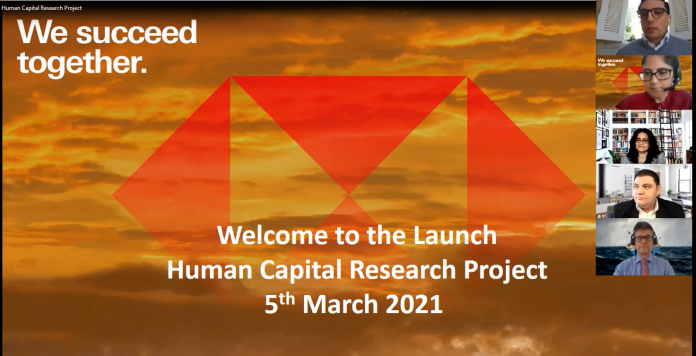The HSBC Malta Foundation is supporting the Human Capital Research Project through a donation of €120,000. The three year-long research project, headed by Dr Rose Marie Azzopardi and Prof Alexiei Dingli and endorsed by the Ministry for Education, will focus on identifying current and future skills in financial services and banking, information technology, communication, professional, scientific and technical services.
Once concluded, the project will contribute to Malta’s ongoing competitiveness in the global economy by delivering a
series of evidence-based policy recommendations.
Simon Vaughan Johnson, CEO at HSBC Malta said: “Malta’s success has always been built on the skill and adaptability of its people. As technology continues to drive exponential change across the globe, it’s never been more important to focus on upskilling and reskilling. The Human Capital Research Project will play a key role in the formation of national policy in this area, something which the HSBC Malta Foundation is committed to support.”
Dr Azzopardi, Senior Lecturer in International Economics at the Faculty of Economics, Management and Accountancy at the University of Malta, said: “Rapid change, increased competitive forces, innovation and technological developments have become a constant in our economies, but making the most of any opportunities which these changes bring remains a challenge. Finding the right mechanisms to help both young people still in education and those already in the workforce, obtain the skills they need in an uncertain world is at the centre of what this project is about.”
Prof Dingli, an Associate Professor in Artificial Intelligence at the Faculty of Information and Communication Technology at the University of Malta, said: “Today’s economy needs people who are imaginative, resilient, respectful of different viewpoints, and able to cope with failure.
In this context, it is critical that our education system gives young people the skills they need to succeed. In recent years, Malta has experienced first-hand that the lack of the right skills can hinder our ability to make the most of growing economic sectors. The Human Capital Research Project aims to provide a framework for policymakers and stakeholders in our economy, which can help avoid such situations in the future.”
Dr Frank Fabri, Permanent Secretary at the Ministry for Education, said: “Malta’s commitment in education, as reflected in recent strategies and policies including the Framework for themEducation Strategy for Malta 2014 – 2024 and My Journey: Achieving through different paths (2016), remains that of an equitable, quality and inclusive education system. Evidence shows that the employment rate of recent graduates (2019) has risen to 93.4% and is the highest in the EU (80.9%), while the not in employment, education or training (NEET) percentage is at 7.9%, the lowest when compared to the EU’s average of 12.6%. We welcome this research project which we believe will definitely contribute to further informing all the work that has been delivered to date and I look forward to the outcome of these studies to continue supporting our students to acquire the future skills for success in the years ahead of us.”










